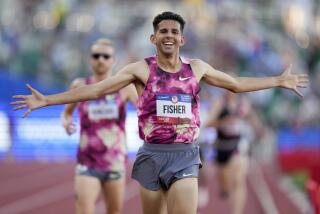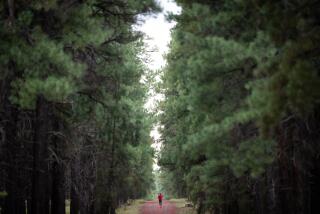Marathoner Is Nothing if Not Enduring
Meb Keflezighi traveled far more than 26 miles, 385 yards to reach the finish line of the Athens Olympic marathon. With each footstep and every breath over the last three miles, knowing he’d win a medal, he thought of the people who had guided him toward this unimaginable destiny.
He reflected on the courage of his father, Russom, who walked 150 miles from the family’s home in Eritrea to Sudan to escape danger after taking an unpopular stance in Eritrea’s war with Ethiopia. Russom worked menial jobs in Italy and later in San Diego, all to create a better life for his 11 children.
He thought of the coaches who saw his potential and put him on the path to a UCLA degree and four NCAA titles. Of his teammates on the Team Running USA club and the coaches and consultants whose planning and encouragement ensured he’d find no hill too steep in Athens. Of his siblings, half a world away at a wedding in Santa Rosa but always in his heart.
“My accomplishment was their accomplishment,” he said. “I was thinking of how far in my life I had come too, this is really happening. But at the same time it’s a joyful moment you think of all the hard work, all these injuries, the things you’ve overcome.
“I had a chance to do the 10K if I wanted to, but the three premier events are the marathon, the mile and the 100 meters. To be at the Olympics, to be in Athens where it all started, to do the original course, the climax event was the marathon and I wanted to be part of it.”
Although he’d had the 39th-fastest time in the field and was running merely his fourth marathon, Keflezighi (pronounced Ka-FLEZ-gee) finished a strong second to Italy’s Stefano Baldini, who’d run 16 marathons. His time of 2 hours 11 minutes 29 seconds was a half-minute faster than he’d predicted and 34 seconds behind Baldini, making him the first U.S. man to win an Olympic marathon medal since Frank Shorter won silver in 1976..
“Usually I’d have more backup plans for him, but I really thought this was going to go,” said Bob Larsen, who recruited and coached Keflezighi at UCLA and coaches him for Team Running USA, which also nurtured women’s marathon bronze medalist Deena Kastor.
“When he went by about the 10-mile mark on the course, from there on he was right about where he should be, maybe 100 and some meters back of the group. They all look like they’re working harder than he is, and he’s got a smile on his face and gives the thumbs up.”
Keflezighi kept his medal in a closet at home until about a month ago, when he put it in a bank for safekeeping. He’s ready to move on and take the next step in his remarkable journey.
The soft-spoken 30-year-old finished second in the 10,000 at the U.S. championships on Thursday at the Home Depot Center in Carson, earning a berth on the U.S. team for the World Championships in Helsinki, Finland, in August. His time of 28:10.57 was 0.19 of a second behind winner Abdi Abdirahman, with whom he sprinted the last 200 meters. It was a respectable showing considering it was his second race of the season and first on the track.
“He had another gear I couldn’t get to but I’m glad I made the team,” Keflezighi said.
Keflezighi, who became a U.S. citizen in 1998 and set the American record of 27:13.98 in the 10,000 in 2001, would have raced several times by now if he hadn’t battled flu early this year. He also endured a series of injuries triggered by what he called “the dog incident.” While trying to flee from a dog while training, he ran backward and hurt his left Achilles’ tendon. While favoring the leg, he hurt his right hip flexor.
“There is a downside, and for me it happened in February and March, when I was getting injured,” he said last weekend at the Olympic Training Center in Chula Vista, Calif. “You have to have the drive to do it. I feel I have a God-given talent. I like to do it. I feel like things are coming around.... I already have the medal and it feels like there’s more to come.”
He wasn’t sure he had more marathons in him after he faded to ninth in his first one, at New York in 2002. But the race intrigued him and he ran at Chicago in 2003 and at the Olympic trials last year. He also qualified for Athens in the 10,000, but Larsen had a feeling Keflezighi would thrive on the hot, hilly marathon course.
Keflezighi, who trained on the hills near Chula Vista and at altitude in Mammoth Lakes, was in superb condition. Larsen had scouted the Athens course and watched Keflezighi closely at the pre-Olympic camp in Crete.
“He runs hills well, as does Deena, up and down, and we felt both of them would handle the heat well,” Larsen said. “And we felt the extremes were something we can plan for.... I thought we could have him in 2:07 shape on a fast course, and that 2:07 shape stood him well.”
Keflezighi plans to run another marathon in the fall and thinks he can trim his 10,000 time. He has also looked beyond his athletic career to consider what might come next, and is thinking of starting a business in which he’d do motivational speaking.
“You run, but I never thought I’d be where I am,” he said. “Everything that I have achieved is not handed to me. It’s taken a lot of work, a lot of perseverance, a lot of pitfalls, a lot of obstacles, but if you persevere and you work hard and stay consistent with it, it will eventually pay dividends for you.”
More to Read
Go beyond the scoreboard
Get the latest on L.A.'s teams in the daily Sports Report newsletter.
You may occasionally receive promotional content from the Los Angeles Times.







